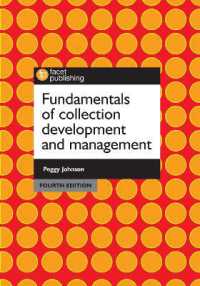- ホーム
- > 洋書
- > 英文書
- > Business / Economics
Full Description
With moderate but sustained economic growth and generally declining inequality, the 2000s were a good decade for Latin America. Moderate poverty fell from roughly 40% to 30% of the population. Economic mobility powered a perceived increase in the ranks of the Latin American middle class. But who, exactly, belongs to that middle class? How much has it really grown? How much economic mobility do these countries really display? Drawing on a unique combination of data sets - income and consumption distributions, test scores, parental characteristics, personal beliefs and attitudes - this volume sheds new light on a period of pronounced social change in Latin America and the Caribbean. It paints a nuanced picture of a society where the intergenerational transmission of socioeconomic status still prevails, but where upward income movement within generations is now significant. It adopts a middle class definition that is based on economic security, and is arguably less arbitrary than others in the literature, and documents a 50% increase in its size. Yet, most of the continent's population is neither poor nor middle-class - but near-poor or vulnerable. The authors argue that there are many potential benefits from a growing middle class, but caution that whether those benefits come to fruition will depend, to a large extent, on whether countries manage to anchor their middle classes into a new, more cohesive, social contract that emphasises the inclusion of those who so far have been left behind.|Although the new European Union Party Financing Regulation is actually a sub-topic of the widely discussed European Constitution, officials have so far been rather quiet about it. The Regulation declares artificially created bodies called ""party alliances"" as political parties for the sole purpose of enabling subsidies from the EU budget to be paid to the European umbrella organizations of the established parties. This book argues that the regulation violates almost every principle of appropriate and legitimate public funding of political parties. Such principles have, for instance, already been drawn up by the German Constitutional Court and the Council of Europe. This book discusses such issues.
Hans Herbert von Arnim is professor of public law at the School for Public Administration in Speyer, Germany. Martin Schurig teaches at the Institute for Public Administration in Speyer, Germany.







